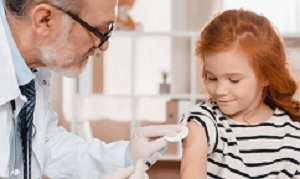 A massive 13-year followup study of more than 650,000 children strongly supports previous findings that MMR vaccination does not increase the risk for autism, does not trigger autism in susceptible children, and is not associated with clustering of autism cases after vaccination.
A massive 13-year followup study of more than 650,000 children strongly supports previous findings that MMR vaccination does not increase the risk for autism, does not trigger autism in susceptible children, and is not associated with clustering of autism cases after vaccination.
More than 20 years ago, Andrew Wakefield came up with a hypothesis linking the measles, mumps and rubella (MMR) vaccine to autism. Time magazine reports that the paper proposing the connection was retracted for methodological issues, and Wakefield’s medical license was revoked for misconduct related to those studies.
But, the report says, his ideas have taken hold on the Internet, where parents concerned about what they see as the toxic ingredients in vaccines, as well as the number of vaccines young infants receive in their first few years, are fuelling the so-called anti-vaccine movement.
The report says measles outbreaks, which are primarily affecting unvaccinated children, are continuing in a number of US states, fuelled by the rising number of parents who are opting out of vaccinations for their kids because of safety questions they have.
The report says Anders Hviid and his colleagues at the Statens Serum Institut and University of Copenhagen, Denmark, and Stanford University School of Medicine, analysed data involving more than 650,000 children born in Denmark between 1999 and 2010, and followed them for up to 13 years. Because Danish identification records include detailed health information, the team could link MMR immunisations and autism diagnoses.
Overall, the report said, the children vaccinated with MMR did not develop autism at a significantly different rate than those who were not vaccinated. The researchers also separately analysed children who might be at higher risk of developing the disorder, including those from families with other siblings with autism, or children with risk factors for autism. They found no higher rate of autism among these children.
The report said the researchers also looked at the timing of autism diagnoses and found that they did not cluster soon after an MMR vaccination. They found no higher rate of autism among kids who received other childhood vaccinations.
Hviid and his colleagues published similar work in 2002 that found no link between MMR vaccination and autism. But, the report said, the latest work includes more autism cases – it is one of the largest studies investigating the connection – and a more in-depth breakdown of the cases by autism risk factors and the timing of diagnoses.
By looking specifically at the children who might be at highest risk of autism, and finding no significantly higher rate of the developmental disorder, Hviid hopes the data will reassure parents who are concerned about the safety of the MMR vaccine. “There are a significant group of parents who are concerned and encounter this idea about vaccines causing autism or cancer on social media, or even from politicians and celebrities,” he is quoted in the report as saying. “We hope that data can reduce some of that concern and convince people that the vaccine doesn’t cause autism.”
Abstract
Background: The hypothesized link between the measles, mumps, rubella (MMR) vaccine and autism continues to cause concern and challenge vaccine uptake.
Objective: To evaluate whether the MMR vaccine increases the risk for autism in children, subgroups of children, or time periods after vaccination.
Design: Nationwide cohort study.
Setting: Denmark.
Participants: 657 461 children born in Denmark from 1999 through 31 December 2010, with follow-up from 1 year of age and through 31 August 2013.
Measurements: Danish population registries were used to link information on MMR vaccination, autism diagnoses, other childhood vaccines, sibling history of autism, and autism risk factors to children in the cohort. Survival analysis of the time to autism diagnosis with Cox proportional hazards regression was used to estimate hazard ratios of autism according to MMR vaccination status, with adjustment for age, birth year, sex, other childhood vaccines, sibling history of autism, and autism risk factors (based on a disease risk score).
Results: During 5 025 754 person-years of follow-up, 6517 children were diagnosed with autism (incidence rate, 129.7 per 100,000 person-years). Comparing MMR-vaccinated with MMR-unvaccinated children yielded a fully adjusted autism hazard ratio of 0.93 (95% CI, 0.85 to 1.02). Similarly, no increased risk for autism after MMR vaccination was consistently observed in subgroups of children defined according to sibling history of autism, autism risk factors (based on a disease risk score) or other childhood vaccinations, or during specified time periods after vaccination.
Limitation: No individual medical chart review was performed.
Conclusion: The study strongly supports that MMR vaccination does not increase the risk for autism, does not trigger autism in susceptible children, and is not associated with clustering of autism cases after vaccination. It adds to previous studies through significant additional statistical power and by addressing hypotheses of susceptible subgroups and clustering of cases.
Authors
Anders Hviid; Jørgen Vinsløv Hansen; Morten Frisch; Mads Melbye
[link url="http://time.com/5542201/measles-vaccine-autism-no-link/"]Time magazine report[/link]
[link url="https://annals.org/aim/article-abstract/2727726/measles-mumps-rubella-vaccination-autism-nationwide-cohort-study"]Annals of Internal Medicine abstract[/link]
